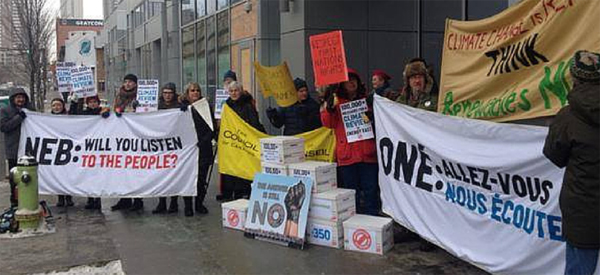Like this article? rabble is reader-supported journalism. Chip in to keep stories like these coming.
The Council of Canadians says the Trudeau government’s interim regulations for pipeline review processes are a good first step, but that there are questions and fundamental issues that still need to be addressed.
CBC reports:
“Natural Resources Minister Jim Carr and Environment Minister Catherine McKenna announced Wednesday [Jan. 27] that the government is launching an interim review process that will impose more steps on projects such as Kinder Morgan’s Trans Mountain and TransCanada’s Energy East pipelines before they can be built. …Moving forward, the environment ministry will analyze greenhouse gas emissions that would result from approving pipeline projects. The results from that study would then be presented to cabinet, which will make the final decision on whether to approve a project. The process will also include greater public, and indigenous consultations on projects, something that is not currently part of the National Energy Board regulatory regime. The new process will be separate from the existing NEB, and take place after the regulator has completed its review of proposed projects.”
Council of Canadians energy and climate justice campaigner Andrea Harden-Donahue writes in a campaign blog:
“Overall, it is clear that the clear criticisms of communities, groups, individuals, First Nations and experts have with the current NEB process are being recognized and heard. There will be a climate test for pipelines. There are efforts around improved consultation with First Nations and communities. There is a longer term goal of modernizing the NEB and environmental assessments given how weakened they have become (particularly under Harper changes).”
But on the key measures of the “climate test” and Indigenous consultations, Harden-Donahue comments:
- “McKenna did confirm that projects will be assessed based on their ‘upstream’ (filling the pipeline, so including oil production) and ‘direct’ (construction) greenhouse gas emissions, but dodged a question about whether these assessments will include downstream emissions (emissions from burning the oil). There was also no mention of the 1.5-degree global warming limit Canada supported in Paris during the climate negotiations. This will be key to evaluating whether this climate test does what it needs to do.”
- “When asked a direct question about whether [deeper consultations with Indigenous peoples] will include respecting ‘free prior and informed consent’ as outlined in the United Nations Declaration on the Rights on Indigenous Peoples, Carr dodged a direct answer. Instead he referred to recent Supreme Court decisions and their ambition to engage in a way that factors in their cultural background and includes this in federal decision making.”
Overall, Harden-Donahue emphasizes, “It remains to be seen how rigorous these changes will really be. First off, Energy East should not be under a transition process, but rather than new NEB and Environmental Assessment process. The Energy East review really hasn’t begun yet (no announced intervenors or timeline for hearings) so why allow it to proceed under an admittedly flawed process? The details around what public engagement will actually be remain vague and it’s hard to envision a transition or supplementary process that will actually redress the clear flaws exhibited in the Kinder Morgan Trans Mountain and TransCanada Energy East reviews.”
A Canadian Press news report on the Liberal government’s announcement yesterday quotes Council of Canadians chairperson Maude Barlow.
Barlow says:
“The recent audit of the NEB reveals deep flaws in the institution, while the board itself is dominated by individuals with a background in the fossil fuel industry. There is also the ongoing priority to reverse and then strengthen the many changes made by Harper that derailed our environmental regulations.”
This refers to the reality that many of the NEB members come straight from the energy industry and that it does not include representation from the environmental movement, the scientific community, First Nations, Inuit, Métis or non-governmental organizations. Her quote also refers to the imperative that the Trudeau government act to restore and strengthen the protections removed from the Navigable Waters Protection Act and the Fisheries Act under the Harper government. Major pipelines can now cross more than 31,000 lakes and 2.25 million rivers without federal scrutiny. The Energy East pipeline alone would cross at least 90 watersheds and 961 waterways along its route.
At a fundamental level, the Council of Canadians has also endorsed the Leap manifesto which calls for “no new infrastructure projects that lock us into increased extraction decades into the future” and asserts that we could have a 100 per cent clean economy by 2050. For more on our energy and climate justice campaign, please click here.
Like this article? rabble is reader-supported journalism. Chip in to keep stories like these coming.



